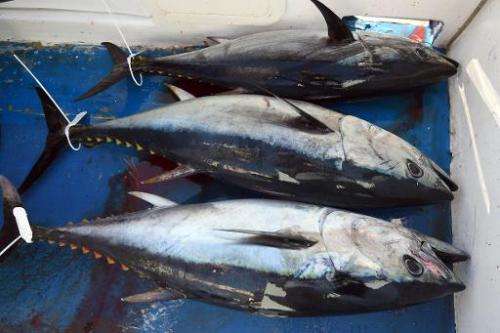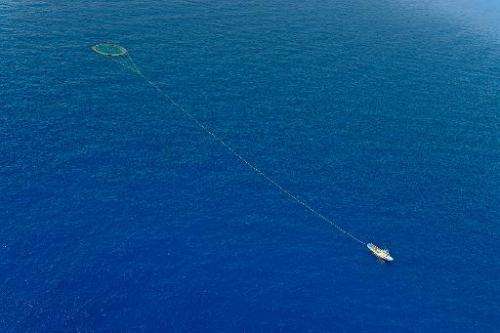20% hike in annual catch agreed for bluefin tuna

Fishing nations agreed Monday to a 20-percent annual increase over three years in quotas of bluefin tuna caught in the Mediterranean and East Atlantic, environmental groups said.
But they failed once more to back a ban on shark-finning—a practice fuelled by demand in Asia—or strengthen protection for the Mediterranean swordfish, the sources said.
The tuna decision came against the backdrop of an apparent recovery in stocks of the species, called Atlantic bluefin.
This year's quota of 13,500 tonnes will rise to 16,142 tonnes in 2015 and 19,296 tonnes in 2016, according to green groups, who attended the meeting as observers.
The 2017 quota has been provisionally set for 23,155 tonnes, but will be reviewed in the light of a stock assessment to be carried out in 2016, they said.
The decision was the culmination of a week-long meeting in Genoa of the International Commission for the Conservation of Atlantic Tunas (ICCAT), an organisation that comprises 48 countries, including the United States and Japan, plus the European Union (EU).
In 2013, the bluefin tuna spawning stock in the East Atlantic and Mediterranean reached 585,000 tonnes, nearly double the levels of the 1950s, according to an ICCAT estimate.
The stock had been decimated to a low of 150,000 tonnes in the mid-2000s. Japan alone consumes more than three-quarters of the annual catch, according to WWF.
Powerful fishing interests had lobbied to hike the quota but environmentalists said the long-term perspective was still unclear. Marine biologists said any increase had to be "moderate and gradual."
"It's hard to apply the term 'moderate' to an annual increase of 20 percent over three years," said Sergi Tudela at WWF Mediterranean.
"We are concerned that the huge conservation efforts of the last years might quickly fade away."

Paulus Tak at the Pew Charitable Trusts said the increased quotas for Atlantic bluefin "are risky and threaten to undo recent gains."
"Significant concerns remain about the ability of these fish to fully recover from a long history of overfishing," he argued.
France, one of Europe's biggest fishing nations, had wanted a 18,500-tonne limit for 2015 and 23,500 tonnes for 2016. Japan had pressed for an immediate quota increase of 33 percent.
"Everybody made some sacrifice. Overall, everybody is equally unhappy," said Japanese delegate Shingo Ota.
In the 1990s, a quota of about 50,000 tonnes per year saw the much-prized species stretched to the limit.
Threatened fish
The ICCAT quota for 2008 was 28,500 tonnes, followed by 22,000 tonnes in 2009 and 12,900 in 2011, a year in which the fish became listed as endangered by the International Union for the Conservation of Nature (IUCN).
The Atlantic bluefin can live up to 40 years and grow to more than four metres (13 feet) long.
The fish spawn just once a year and do not reach reproductive maturity until they are eight to 12 years old, making them more vulnerable to overfishing than smaller species which spawn more frequently.

Earlier Monday, the IUCN said it had added the Pacific bluefin tuna, a cousin species, to its Red List of threatened wildlife.
The fish moved from the "least concern" category to "vulnerable," in the light of relentless demand from Asia's sushi and sashimi markets, it said.
The Genoa meeting also widened fishing possibilities for bluefin tuna in the western Atlantic.
But it failed to agree on new measures to end shark-finning—a proposal made by the EU for the sixth time in a row—or reduce catches of Mediterranean swordfish.
The marine conservation organisation Oceana said it was happy at the deal on tuna but said the price was a damaging tradeoff.
It blamed "a minority group led by Japan and China" for thwarting the proposal that all sharks be landed with their fins naturally attached.
"Swordfish catches have declined across much of the Mediterranean Sea and the fishery is clearly unsustainable, with juvenile fish now representing 75 percent of catches," Oceana marine scientist Ilaria Vielmini added.
"ICCAT cannot keep turning deaf ears to these alarm signals."
© 2014 AFP



















